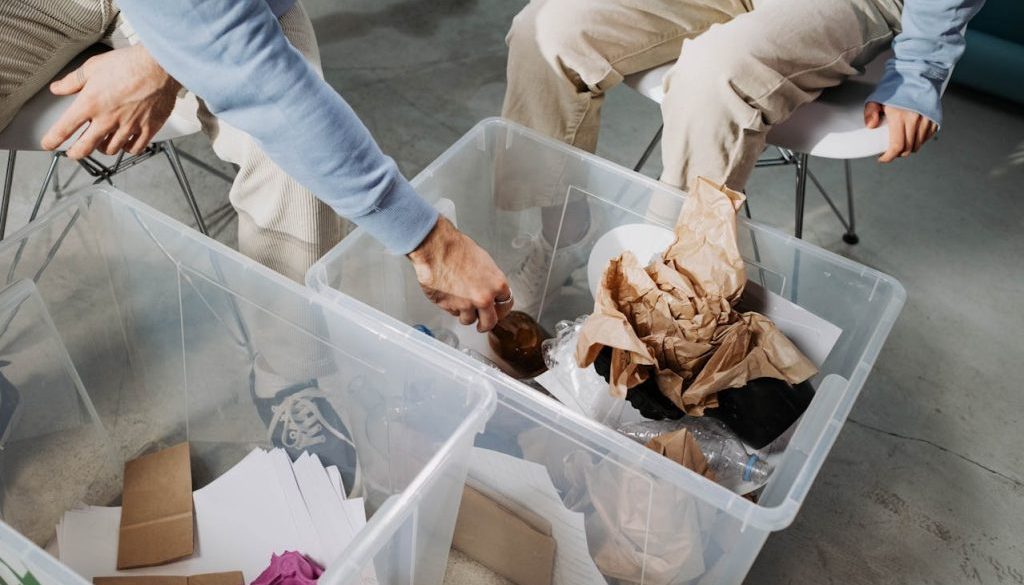Recycling at home should be a straightforward task we all engage in to take care of the planet. Though our intentions are often good, small errors can lead to larger issues in the recycling process. Mistakes can turn efforts on their head, causing problems not just for you but for everyone involved in recycling. When recyclables are contaminated or incorrectly sorted, entire batches can be rejected by recycling facilities, pushing us further from our eco-friendly goals.
Understanding and avoiding common pitfalls in home recycling can make significant strides for the environment. It adds up to a cleaner, more effective system that benefits everyone. By refining our recycling habits, we help ensure that our efforts translate into real environmental progress.
Failing to Rinse Containers
One common mistake people make is failing to rinse containers before tossing them in the recycling. When food or drink residues are left in items like jars, bottles, or cans, they can end up spoiling the entire batch. Even a bit of sauce or a sip of juice can turn perfectly good recyclables into waste.
To avoid this, it’s important to rinse out food containers and drink bottles before putting them in the bin. Here are a few easy ways to do it:
– Use leftover dishwater to swish out jars and cans.
– Place stubbornly sticky items in warm water for a while before rinsing.
– Give bottles a quick shake with a bit of soapy water if they’re still greasy.
Rinsing doesn’t mean scrubbing everything thoroughly, but giving a simple rinse is enough to remove most residues. When recyclables are clean, they can’t spoil the rest of the batch, and recycling facilities can process them efficiently.
Mixing Non-Recyclables with Recyclables
Another common error is mixing non-recyclables with recyclables. People often throw items like plastic bags, polystyrene, and certain types of plastic into the recycling bin, thinking they belong there. Unfortunately, these items can’t be processed in regular recycling facilities and can even damage sorting equipment.
Consider the following common misconceptions:
– Plastic bags often end up tangled in machinery, causing delays and repairs.
– Polystyrene is lightweight but isn’t recycled in standard processes due to its brittleness.
For these kinds of materials, alternative disposal methods are needed. Some shops offer recycling points for plastic bags, while local waste management services might accept polystyrene separately. Taking a moment to sort correctly can make recycling more effective and less troublesome for everyone involved.
Ignoring Local Recycling Guidelines
Many people overlook the specific recycling rules set by their local council, assuming that all recycling principles are the same everywhere. However, recycling guidelines can vary significantly, affecting what materials you can recycle and how they should be sorted. For instance, one area might accept glass jars and bottles, while another might only want you to recycle plastic with specific recycling numbers.
It’s important to stay informed about these local differences to recycle effectively. You can usually find this information on your council’s website or in mailers provided by local waste management services. Some councils also offer apps that provide up-to-date information and reminders to keep you on track. Taking a little time to get to know your local regulations can make a big difference in ensuring your recyclables are processed efficiently, rather than ending up in a landfill due to incorrect sorting.
Bagging Recyclables
Putting recyclables in plastic bags is a blunder that complicates recycling efforts. Many recycling facilities don’t open these bags, meaning their contents often end up discarded as regular waste. Facilities have to deal with plastic bags jamming the machinery, which hampers efficiency.
To keep recycling simple and effective, try these strategies:
– Use separate bins for recyclables and ensure they’re emptied directly into recycling containers.
– Avoid plastic bags altogether by using reusable containers or baskets to collect recyclables at home.
– Educate your household on how recycling should be separated, reinforcing the habit of keeping items loose.
By making these small adjustments, you ensure that your recyclables have the best chance of being processed properly.
Making Recycling Easier for Your Household
Streamlining recycling at home doesn’t have to be complicated. A few tweaks in your daily routine can significantly improve your household recycling efficiency. Start by designating clear spaces in your home for different types of recyclables. This organisation helps keep everyone on the same page, reducing likelihood of mistakes.
Encourage the family to participate by creating a simple system that’s easy to follow. Label bins clearly and remind everyone which materials go where. Regularly review what can and can’t be recycled in your area so the whole family is informed and motivated to contribute to recycling efforts correctly.
While setting up an efficient recycling system at home, you might find that professional guidance can offer additional insights and convenience. Professionals can help with larger tasks, ensuring that big recyclables or waste from projects are taken care of properly. Consider seeking expert assistance to make waste management stress-free, while keeping you aligned with responsible environmental practices.
If you’re looking to improve recycling efficiency and keep your waste management stress-free, consider using Stone Skip Hire to handle your larger recycling needs. Enviro Skip Hire offers a range of services to ensure your recyclables are managed quickly and responsibly, helping to keep Cheshire cleaner and greener.




